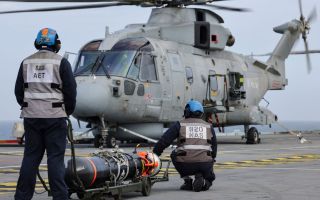Warship HMS Defender destroys drone during large naval and missile defences test
Royal Navy warship HMS Defender has destroyed a jet drone during the 'world's largest test of naval and missile defences'.
The Type 45 destroyer is currently deployed to Scotland's Outer Hebrides for Formidable Shield 2023 to test missiles, systems, sensors and software against ballistic, subsonic and supersonic targets, alongside 13 Nato and partner nations.
According to the Royal Navy, HMS Defender led their participation as a "dedicated air defence destroyer designed to shield a task group, culminating in a firing of her Sea Viper missile system – the £1bn warship's primary weapon – during a mission to locate, and destroy a drone designed to be difficult to track and intercept".
'Ready for the fight of tomorrow'
The Sea Viper missile was fired from Defender against the highly-manoeuvrable drone – designated Bruiser 9384 – which travels at hundreds of miles an hour.
'Bruiser' is the Nato codeword for an anti-ship missile.
Petty Officer Cameron McDonnell, who controlled the Sea Viper, said: "We've been using experimental hardware and software to push our sensors to the limit, ready for the fight of tomorrow.
"We've tracked ballistic, subsonic and supersonic targets while working with our allies and partners.
"The final stage saw HMS Defender conduct a live missile engagement against an uncrewed aerial vehicle."
Each Type 45 destroyer carries up to 48 missiles, says the Royal Navy, each held in a vertical-launch silo on the forecastle at the front of the ship and capable of taking out aerial threats at ranges up to 75 miles away, manoeuvring for the kill at G forces no human can withstand.
Defender has also "helped push the boundaries of missile and air defence – and her Sea Viper system, ensuring its abilities against a variety of difficult-to-intercept incoming targets", says the Navy.
Sea Viper Evolution
The missile system is undergoing a £300m upgrade to ensure the Navy is protected from the latest threats, including anti-ship ballistic missiles.
Known as Sea Viper Evolution, the enhancements to both the radar and missile will support 54 jobs in the UK at sites from the Isle of Wight to Hertfordshire, Bristol and Bolton.
"Every year we try something new, something harder; to challenge ourselves and our equipment," Lieutenant Commander Marin-Ortega explained.








